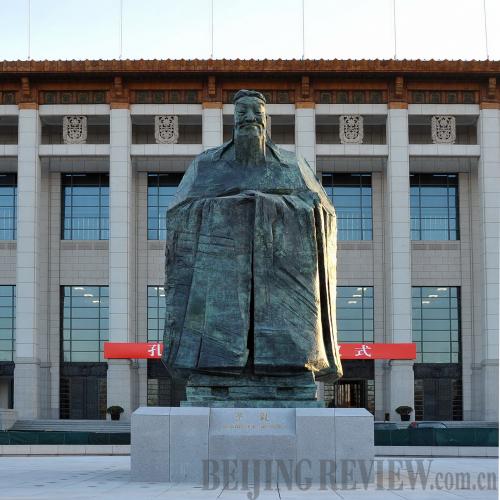|
 |
|
(CFP) |
On January 11 this year, a bronze 7.9-meter-tall statue of Confucius (551-479 B.C.) was unveiled in front of the renovated National Museum of China in Beijing. The erection of this statue in such a prominent position has triggered people's dispute over whether it is appropriate to have a statue of Confucius in front of the National Museum.
For generations, Confucius has been a target of criticism in China as a spiritual spokesman for feudalism. Although a craze for traditional Chinese culture has been rekindled in recent years, there is still lack of a consensus on how to read and treat Confucius and Confucianism. Meanwhile, Confucius has been promoted as a symbol of Chinese traditional culture to the rest of the world, with the establishment of Confucius Institutes around the world.
In a survey conducted by People.com.cn, seeking people's views on the erection of Confucius' statue in front of the National Museum, 70 percent of 220,000 participants said it's wrong to put the statue there, since not everyone is interested in Confucianism.
Approval
Tang Wenming (www.rujiazg.com): Confucius, as the representative of Confucianism, is a great man of China's culture and history. It's all right to have the statue erected in front of the National Museum. In modern times, Confucianism will help the Chinese to develop a better understanding of their way of life and help them know how to express their experience of life.
For quite a long time in the past decades, with the introduction of Western concepts and philosophies, some Chinese have lost confidence in or have a wrong understanding of Chinese culture and ways of life based on this culture. If the essence of Confucianism can be well understood and used, it will be good for China's social development, as well as people's daily life.
The Analects, which is a collection of Confucius' quotations, is nowadays attracting huge attention from the Chinese. More importantly, study of The Analects did not originate from any official move, but has grown and spread totally among ordinary people. This phenomenon implies that, since the 1980s, new problems have emerged in Chinese life, and they're about spiritual and cultural beliefs. It is in this context Confucianism represented by Confucius is regaining power and influence.
Zhu Yongxin (www.people.com.cn): It's absolutely necessary to erect a statue of Confucius in front of the National Museum. Confucius deserves this honor. His ideas and concepts have been exerting an influence on Chinese society for thousands of years and they also make up the basic tenets of Chinese culture. A lot of sayings from The Analects have become basic rules or beliefs of Chinese culture, such as "Walking in the company of others, there is bound to be something I can learn from them" and "Don't do unto others what you don't want others to do unto you."
Even if Confucius is such a representative figure we still haven't designated a special day to commemorate him. Looking around the world, in many countries, there are days to commemorate the country's native culture and spirit, such as Shakespeare in Britain. I have always proposed not only erecting the Confucius statue, but also designating September 28, the birthday of Confucius, as an important festival—National Reading Day, because Confucius stressed the importance of learning. This is reflected in his famous saying: "Isn't it a pleasure to learn and then review what you've learned?"
| 